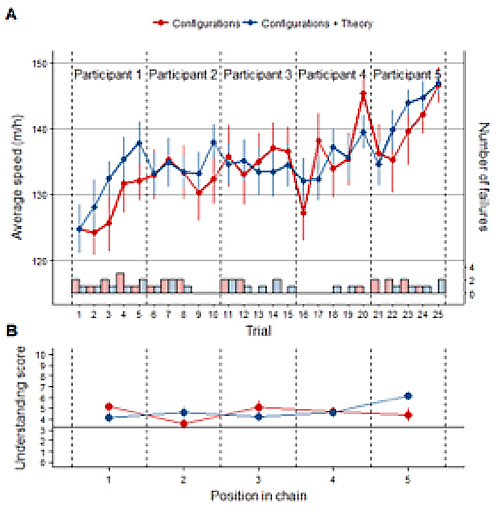How do we improve our technology? Some argue that we sapiens have mad cognitive skills enabling us to develop causal theories that are a roadmap to improvement. Others say that even what we consider a simple technology, say an arrowhead, it is too complex to establish a causal theory, you need to know aerodynamics, choose the right material, malleable enough to shape, strong enough to maintain its form, and that doesn’t consider understanding how actually to shape the flint. These advocates argue for a more evolutionary transmission, the best practices past on, the dead-ends ignored. To test whether theory or evolution could drive improvement, a group of researchers performed an experiment.
The Experiment
They asked 14 groups to optimize the performance of a wheel rolling down an inclined plane. From established physics, the problem is relatively simple the wheel’s performance is based on
- How mass, in this case, weights, are distributed around the axis – the moment of inertia
- Where the mass is located on the wheel in relation to the track – the initial potential energy [1]
Each group consisted of five members, who, one after another, had five trials to optimize the wheel’s speed, by varying the distance of the weights from the axis. The participants were made aware of their results and standing (regarding speed) after each trial. Each group member except the first was given the results of the previous member’s last two trials – the experimental version of the evolutionary transmission of technology. At the end of the trials, the participants were asked to determine which of ten pairs of wheels in various configurations would move faster and then write down the theory behind their choices [2] – the experimental version of the cognitive transmission of technology.
 In the evolutionary group, participants were provided the last two designs and their associated scores; for the cognitive group, they were given the theory and the last two designs and scores. Participants received token payments based on their performance and the next two trials in their evolutionary or cognitive chains.
In the evolutionary group, participants were provided the last two designs and their associated scores; for the cognitive group, they were given the theory and the last two designs and scores. Participants received token payments based on their performance and the next two trials in their evolutionary or cognitive chains.
The results: over the generations wheel performance improved, but theory did not, even when the theory was shared. Our technology can improve over time without an explicit causal theory.
The researchers also considered the effect of theory, when passed along to the next "generation," on subsequent wheel configurations. Theories based on inertia generated wheels optimize for inertia, those based on potential energy, optimize for potential energy. Only a complete theory led to balanced configurations optimizing both factors at once. The absence of theory resulted in that evolutionary random walk that still optimized performance.
The takeaway
Having causal theories is at once a boon and a bane. Those with a complete theory produced optimized wheels. Those whose theory was incomplete persisted in optimizing what the theory suggested. The researchers showed that theory could blind one to better alternatives. Can you see the parallel with our thinking about the causal effect of our diet on our health? The fats are bad theory optimizes to reduce fats. Similarly, the sugar is bad crowd optimizes to reduce sugar. And while both groups may produce their optimum, it is not necessarily the optimum; We could optimize our diet simply by eating what works for us, no overarching theory of what or when may be necessary. And the same holds for other causal inquiries, like the cause of diabetes or heart disease. I am not advocating that we abandon theory simply that we recognize both its benefits and limitations. The study was small, the results not yet replicated, but it should give us pause to contemplate whether empiricism, doing what works, may get us down the same road at the same pace as a theory.
[1] Wheels with the weight closer to the axis spin faster and when the weight is in the upper right of the wheel when it begins to role it has the greatest potential energy. The wheel was chosen because it had few variables, therefore not complex and because most of their subjects had little knowledge of these wheel dynamics.
[2] Theories had to begin with the phrase “The wheel cover the distance faster when…” and could not be less than 350 characters (about 70 words). Theories were scored on to what degree they referenced inertia and potential energy using practical actionable terms.
Source: Causal understanding is not necessary for the improvement of culturally evolving technology PsyArXiv DOI: 10.31234/osf.io/nm5sh




